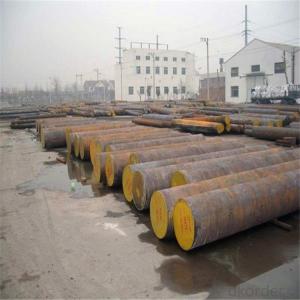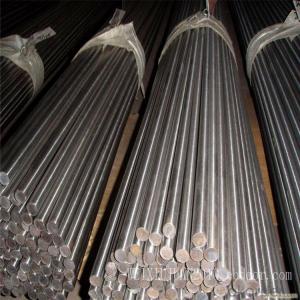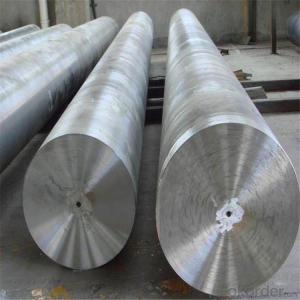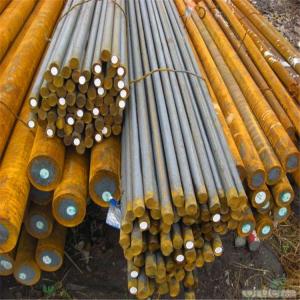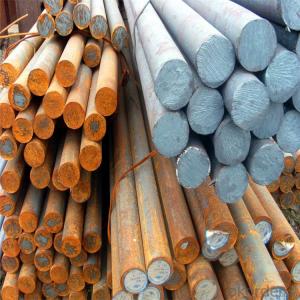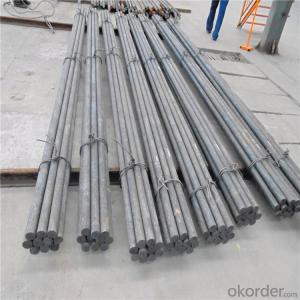Medium Carbon Alloy Steel Bar S45C, S55C, SUJ-2
- Loading Port:
- Tianjin
- Payment Terms:
- TT OR LC
- Min Order Qty:
- 100 m.t.
- Supply Capability:
- 500000 m.t./month
OKorder Service Pledge
OKorder Financial Service
You Might Also Like
Item specifice
Medium Carbon Alloy Steel Bar S45C, S55C, SUJ-2
Product Description of Medium Carbon Alloy Steel Bar S45C, S55C, SUJ-2
1. Steel grade: ASTM4140, SCM440, 42CrMo, DIN1.7225
2. Length: 6M-12M
3. Diameter: 16mm-300mm
4. Product range: round bar, flat bar, square bar
5. Technique: Hot rolled, forged, cold drawn
Specification of Medium Carbon Alloy Steel Bar S45C, S55C, SUJ-2
Material | SCM4140 | Round bar | Dia(mm) | 16-300mm |
Process | EAF + LF + VD + Forged + Heat Treatment (optional) | Length (mm) | Max 12m | |
Heat treatment | Normalized / Annealed / Quenched / tempered | Flat bar | Thickness(mm) | 8-500mm |
Delivery condition | Hot forged +Rough machined (black surface after Q/T)+ Turned (optional) | Width(mm) | 70-200mm | |
Test | Ultrasonic test according to SEP 1921-84 D/d | Length (mm) | Max 12m |
Chemical Composition of Medium Carbon Alloy Steel Bar S45C, S55C, SUJ-2
C | Si | Mn | Cr | Mo | P | S |
0.38~0.43 | 0.15~0.35 | 0.75~1.00 | 0.8~1.1 | 0.15~0.25 | ≤0.035 | <0.04< td=""> |
Photo Show of Medium Carbon Alloy Steel Bar S45C, S55C, SUJ-2
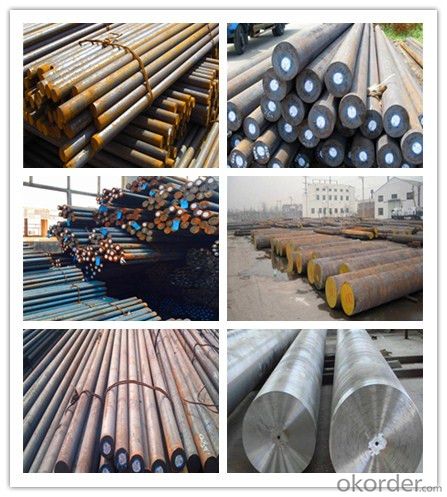
Packing and Delivery:
Packing in bundle package, or as customer's requirements.
Delivery Detail: 45 days after receiving the deposit.
Usage and Applications of Medium Carbon Alloy Steel Bar S45C, S55C, SUJ-2
1. Steel round bar is used in a large number of architectural and engineering structures. Or it can be used in construction of plants for the production of steel house frames, high-voltage transmission towers, bridges, vehicles, boilers, containers, ships, etc.
2. And we can use this kind of product on the performance of the mechanical parts if the demand is not very high.
3. Some special material steel round bar can be used for main shaft of steamer, hummer shank, with big section and supper force.
Company Information
CNBM International Corporation is the most important trading platform of CNBM group.
Whith its advantages, CNBM International are mainly concentrate on Cement, Glass, Iron and Steel, Ceramics industries and devotes herself for supplying high qulity series of refractories as well as technical consultancies and logistics solutions.


F A Q
1, Your advantages?
professional products inquiry, products knowledge train (for agents), smooth goods delivery, excellent customer solution proposale
2, Test & Certificate?
SGS test is available, customer inspection before shipping is welcome, third party inspection is no problem
3, Factory or Trading Company?
CNBM is a trading company but we have so many protocol factories and CNBM works as a trading department of these factories. Also CNBM is the holding company of many factories.
4, Payment Terms?
30% TT as deposit and 70% before delivery.
Irrevocable L/C at sight.
5, Trading Terms?
EXW, FOB, CIF, FFR, CNF
6, After-sale Service?
CNBM provides the services and support you need for every step of our cooperation. We're the business partner you can trust.
For any problem, please kindly contact us at any your convenient time.
We'll reply you in our first priority within 24 hours.
- Q:Can steel round bars be used for structural purposes?
- Yes, steel round bars can be used for structural purposes. They are commonly used in the construction industry for various applications, such as providing support and reinforcement in buildings, bridges, and other structures. The high strength and durability of steel make round bars an ideal choice for structural use, as they can withstand heavy loads and provide stability.
- Q:Can steel round bars be bent or shaped?
- Certainly! Steel round bars have the capability to undergo bending and shaping. Steel, being a highly malleable material, can be formed into desired shapes through different processes. Techniques such as hot bending, cold bending, or induction bending can be employed to bend the steel. By applying force to the steel bar, it can be deformed and molded into the desired shape. Moreover, machining processes like turning, drilling, milling, or grinding can also be utilized to shape steel round bars. These processes enable the creation of various profiles, including cylindrical, square, or hexagonal shapes, among others. In summary, steel round bars provide great flexibility for bending and shaping, allowing for their versatile use in a wide range of applications.
- Q:Can steel round bars be used for making marine equipment?
- Certainly! Steel round bars are a viable option for the fabrication of marine equipment. Steel, being a versatile and resilient material, is extensively utilized in the maritime industry owing to its exceptional strength, resistance to corrosion, and capacity to endure harsh environmental conditions. By manipulating steel round bars, through machining, welding, and shaping, one can create a wide array of sizes and forms that precisely meet the unique specifications of marine equipment. Predominantly, these round bars are employed in the production of marine components such as propeller shafts, rudders, anchor chains, and structural supports. Moreover, to augment its resistance to corrosion, steel can be coated or treated, ensuring its suitability for prolonged exposure to saltwater and other corrosive elements prevalent in marine settings.
- Q:How to make the round welds on flat steel flat and qualified?
- It is required that the current is suitable and the bar is stable. If required, the groove can be turned on the round steel to ensure that the welding is beautiful and qualified
- Q:How do steel round bars compare to other materials like aluminum or titanium?
- Steel round bars have numerous advantages over materials like aluminum or titanium. Firstly, steel is renowned for its exceptional strength and durability, possessing a high tensile strength that enables it to withstand heavy loads and resist deformation under stress more effectively than aluminum or titanium. This makes steel round bars an excellent option for applications necessitating robust structural support. Moreover, steel boasts a higher melting point in comparison to aluminum, rendering it more suitable for high-temperature environments. It can endure extreme heat without compromising its strength, making it the preferred choice for industries such as construction, manufacturing, and automotive. Furthermore, steel round bars offer a cost-effective solution. Generally, steel is more affordable than titanium, making it a more budget-friendly alternative for a variety of projects. Additionally, steel is readily available and easily sourced, while obtaining titanium can be more challenging and manufacturing it can be more expensive. Nevertheless, it is imperative to acknowledge that aluminum and titanium possess their own unique advantages. Aluminum, for instance, is lightweight and exhibits excellent corrosion resistance, making it the preferred material for industries like aerospace, marine, and automotive. Conversely, titanium is renowned for its exceptional strength-to-weight ratio and corrosion resistance. It is commonly utilized in applications requiring high strength and low weight, such as aircraft components and medical implants. In conclusion, steel round bars offer unparalleled strength, durability, and cost-effectiveness when compared to aluminum or titanium. However, choosing the appropriate material ultimately depends on the specific requirements of the project, as each material possesses distinct advantages and applications.
- Q:What are the tolerance standards for steel round bars?
- The tolerance standards for steel round bars differ based on specific requirements and industry norms. Generally, the tolerance for the diameter or size of steel round bars is specified as a plus or minus tolerance. This implies that the actual diameter of the bar may slightly deviate from the specified size, but it must fall within the specified tolerance range. In certain industries, like construction or manufacturing, the tolerance for steel round bars may be broader to facilitate easier fabrication and installation. For instance, a common tolerance range for the diameter of steel round bars used in construction could be ±0.005 to ±0.010 inches. In more precise applications, such as aerospace or automotive industries, the tolerance requirements for steel round bars are typically stricter. In these cases, the tolerance range can be significantly smaller, often ranging from ±0.001 to ±0.002 inches. It is important to note that different countries and organizations may have their own specific tolerance standards for steel round bars. These standards are usually outlined in industry-specific documents or specifications, such as ASTM (American Society for Testing and Materials) or ISO (International Organization for Standardization) standards. In summary, the tolerance standards for steel round bars vary depending on the specific requirements of the industry and application. The tolerance range for diameter can range from relatively broad to extremely tight, and these standards are typically defined by industry-specific organizations or standards bodies.
- Q:Are lightning checks required for galvanized steel, flat steel and round steel?
- The corrosion resistance of cold galvanizing is not as good as that of hot-dip galvanizing. It is used as lightning protection and grounding material. It is corroded quickly, and the grounding resistance is raised rapidly. It exceeds the required resistance.
- Q:Can steel round bars be customized or fabricated?
- Yes, steel round bars can be customized or fabricated to meet specific requirements. Steel round bars are commonly used in various industries such as construction, manufacturing, and engineering. They can be customized in terms of diameter, length, surface finish, and even material composition. Customization of steel round bars can be done through various processes. For example, the bars can be cut to the desired length using techniques like sawing or shearing. They can also be bent or shaped using heat and mechanical force to achieve specific angles or curves. Additionally, the surface finish of the bars can be altered through processes like grinding, polishing, or coating. Furthermore, steel round bars can be fabricated to include additional features or components. For instance, holes or slots can be drilled or machined into the bars to accommodate other parts or fasteners. They can also be threaded or grooved to allow for easy assembly or connection with other components. In summary, steel round bars can be customized or fabricated in various ways to suit specific needs. Whether it is altering the dimensions, shape, surface finish, or adding additional features, steel round bars offer flexibility and versatility in meeting different requirements across industries.
- Q:What are the advantages of using nickel-tin alloy steel round bars?
- There are several advantages of using nickel-tin alloy steel round bars. Firstly, nickel-tin alloy steel has excellent corrosion resistance properties. This makes it ideal for applications where the round bars will be exposed to harsh environments or corrosive substances. The addition of nickel and tin enhances the overall durability and longevity of the round bars, ensuring they can withstand prolonged exposure to moisture, chemicals, and other corrosive elements. Secondly, nickel-tin alloy steel round bars offer superior strength and toughness. The combination of nickel and tin in the alloy composition enhances the overall mechanical properties of the bars, making them highly resistant to deformation, bending, and breaking. This makes them suitable for demanding applications that require high strength and durability, such as in construction, aerospace, and automotive industries. Additionally, nickel-tin alloy steel round bars exhibit excellent heat resistance. They can withstand high temperatures without significant loss of strength or deformation. This makes them ideal for applications that involve exposure to elevated temperatures, such as in furnaces, boilers, and heat exchangers. Furthermore, nickel-tin alloy steel is known for its excellent electrical conductivity. This property makes the round bars suitable for applications that require efficient electrical transmission, such as in electrical wiring, power generation, and electrical equipment manufacturing. Lastly, nickel-tin alloy steel round bars are relatively easy to machine and fabricate. They can be readily shaped, cut, and welded, allowing for versatility in various manufacturing processes. This ease of machining and fabrication ensures efficient production and reduces overall manufacturing costs. In conclusion, the advantages of using nickel-tin alloy steel round bars include excellent corrosion resistance, superior strength and toughness, high heat resistance, good electrical conductivity, and ease of machining and fabrication. These properties make nickel-tin alloy steel round bars a preferred choice for a wide range of applications in various industries.
- Q:Are steel round bars used in the aerospace industry?
- Indeed, it is common practice to employ steel round bars within the aerospace industry. Renowned for their exceptional strength, durability, and resistance to corrosion, these round bars prove themselves as an excellent choice for aircraft components and structures. They find frequent application in the creation of landing gears, engine mounts, structural frames, and other pivotal aircraft parts. Moreover, steel round bars are also utilized in the production of aerospace fasteners, such as bolts and screws, owing to their capacity to endure immense stress and establish a steadfast connection. In summary, the pivotal role played by steel round bars in guaranteeing the safety and dependability of aerospace systems cannot be overstated.
1. Manufacturer Overview |
|
|---|---|
| Location | |
| Year Established | |
| Annual Output Value | |
| Main Markets | |
| Company Certifications | |
2. Manufacturer Certificates |
|
|---|---|
| a) Certification Name | |
| Range | |
| Reference | |
| Validity Period | |
3. Manufacturer Capability |
|
|---|---|
| a)Trade Capacity | |
| Nearest Port | |
| Export Percentage | |
| No.of Employees in Trade Department | |
| Language Spoken: | |
| b)Factory Information | |
| Factory Size: | |
| No. of Production Lines | |
| Contract Manufacturing | |
| Product Price Range | |
Send your message to us
Medium Carbon Alloy Steel Bar S45C, S55C, SUJ-2
- Loading Port:
- Tianjin
- Payment Terms:
- TT OR LC
- Min Order Qty:
- 100 m.t.
- Supply Capability:
- 500000 m.t./month
OKorder Service Pledge
OKorder Financial Service
Similar products
New products
Hot products
Related keywords
